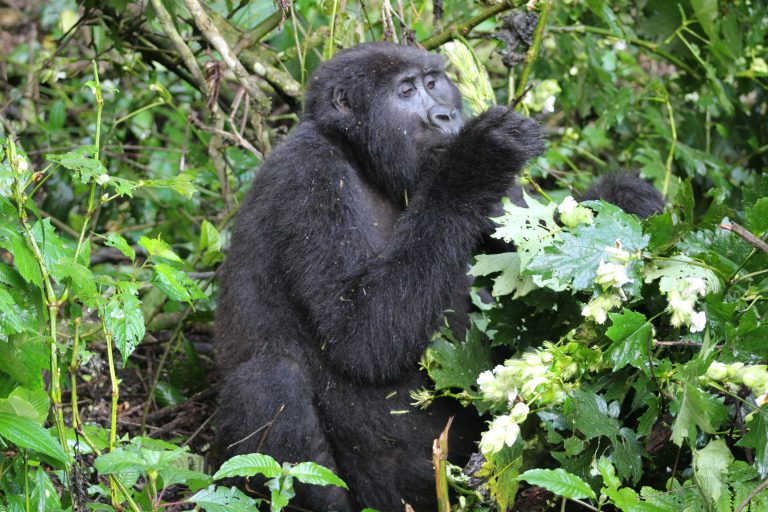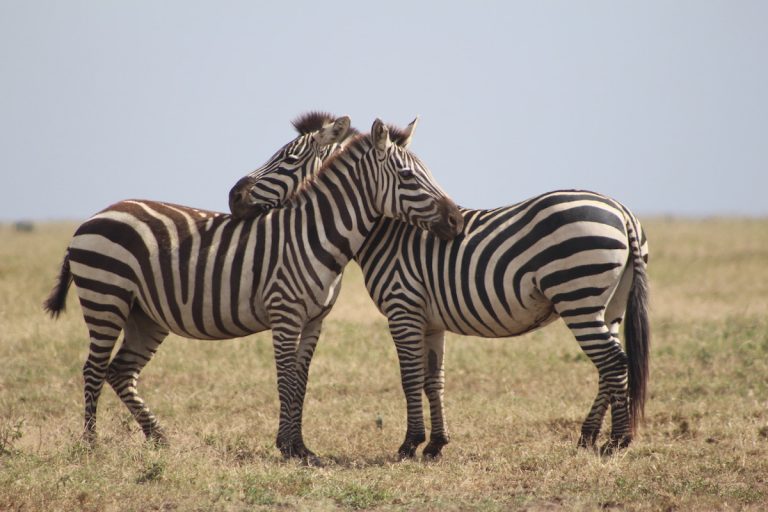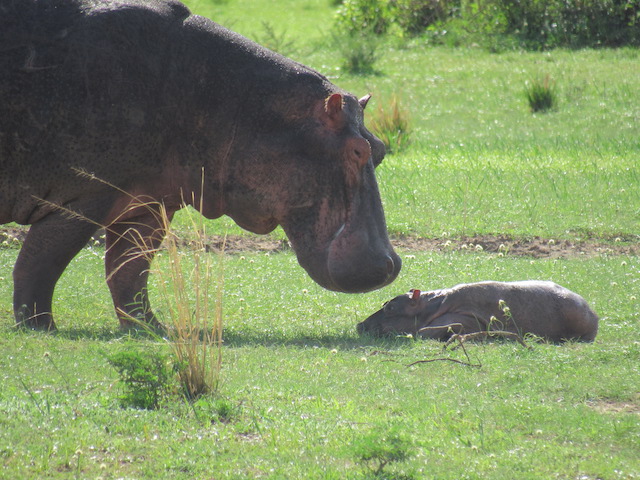Chimpanzees, also known as chimps are a fascinating species of apes found in the savannahs and thick tropical forests of Africa, with their current range spanning over 21 African countries. In Uganda you can enjoy chimpanzee trekking safari in Kibale national park, Kalinju forest, Kyambura forest, Semuliki forest and Budongo forest. Chimpanzee trekking in Rwanda is done in Nyungwe national park. In Kenya, you can see chimpanzees at Sweetwaters chimpanzee sanctuary and in Tanzania they are found in Mahale national park and Gombe national park.
Chimpanzees are characterized by coarse black fur, a bare face, fingers, toes, palms on their hands, and soles on their feet. Their arms are longer than their legs and though they can move on their two feet, they often use all four limbs. A male chimpanzee weighs between 40 – 70 kg (88 – 154 lbs.) whereas a female weighs between 27 – 50kg (60 – 110 lbs.). Chimpanzees have an average height of 4 to 5.5ft, which is relative to a 6ft tall man. Furthermore, the average life span of a chimpanzee in the wild is 45 years and 58 years in confinement. Nonetheless, there have been rare records of older chimpanzees that have lived up to 80 years. Chimpanzees are very impressive animals that create memorable experiences for tourists, given their remarkable creativity. Here are 5 fun facts about chimpanzees;
Social Behavior
Chimpanzees are generally lively animals and are very social compared to gorillas or orangutans. Similar to humans, chimpanzees live in groups often known as communities that tend to change over time and; are based on associations between adult males within a territory. A community of chimps can range from 20 or less to even 80 individuals and above, with each community consisting of numerous sub-groups; of mostly unstable structure. A chimp community is headed by a dominant male and can only have one dominant male; as such, chimp communities often have twice or three times as many adult females as adult males.
Chimpanzees can display complex social tactics such as cooperation during battle and forming coalitions and alliances; they often do this through mutual grooming and sometimes sharing meat or mating opportunities. Chimps can comfort, reconcile and strike back during fights. Like humans, they grieve, show sympathy and are curios.
Communication
Chimpanzees have some of the most unique forms of communication: ranging from expressions and gestures, to vocals such as hoots, roars, grumbles, and screams. Each of these signs of communication is used to portray a particular message. Chimpanzees use louder calls and signals such as drumming on trees when communicating at a long distance. On the other hand, they use softer calls to communicate at a shorter distance. And like humans, chimpanzees have been seen to smile, laugh and grin.
Use of Tools
Another interesting fun fact about chimpanzees is their remarkable intelligence in the use of various tools, mostly when they are foraging for food. Chimpanzees often use stones, wood, and sometimes roots to crash hard nuts, in addition to using leaves to drink water. They also use leaves for hygiene purposes such as wiping their mouths and other body parts. Chimpanzees use small sharp branches or grass stalks to hunt for termites. In cases of danger, chimpanzees will throw rocks and branches: and if they came across a dead snake or anything suspicious, they will use a stick to poke and check it out.
Habitat and Feeding
Chimpanzees spend most of their time both on tree tops and the ground though they often sleep in trees: they build themselves nests mostly in the robust Ugandan ironwood tree, which provides a foundation for stable nests. And given their diet, their natural habitat is restricted to tropical forests and savannah woodland. And though a large population is found in the tropical rainforests, others can be found in the savannah woodlands.
Chimpanzees are generally omnivores; their diet majorly consists of fruits, shoots, bark, leaves, seeds, and flowers, they also feed on soil, honey and birds. They have been seen hunting down smaller animals such as red tailed-monkeys and antelopes. They begin their day at dawn when they set out of their nests to look for places with food. Most of their feeding is done in trees but also forage on the ground. They are expert climbers who like to jump and swing between tree canopies using their long arms. Chimpanzees like to take a nap in the afternoon after feeding.
Reproduction
Although similar to human beings, chimpanzees mate only for reproduction. Female chimpanzees reach maturity by age 13 and when a female hits maturity, she will develop a large pink swelling on her behind, portraying that she is ready to mate. Females can engage with different mating partners or specifically one, but in most cases, they engage with several.
Their gestation period lasts 8 months and they can give birth at any time of the year to one offspring. For the first two years, the offspring will hang on to the mother for support and protection. Weaning among chimpanzees is at 4 years and after that, they become independent. However, sexual maturity in both males and females is about 10 to 12 years.
Chimpanzee trekking Safaris
6 Days Rwanda Classic Primate Safari





